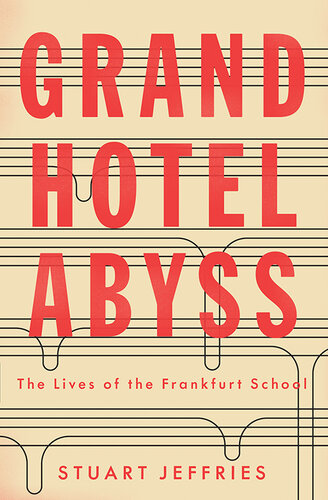
Grand Hotel Abyss
The Lives of the Frankfurt School
کتاب های مرتبط
- اطلاعات
- نقد و بررسی
- دیدگاه کاربران
نقد و بررسی

January 16, 2017
In his erudite group biography of the thinkers who formed the core of the Frankfurt Institute of Social Research, English journalist Jeffries alternates between revealing the lives of these men and recounting the development of critical theory, the Frankfurt School’s most notable contribution to philosophy. Dividing the history of the Frankfurt Institute into decades, Jeffries effectively demonstrates how the school responded to the historical challenges of the 20th century. The school was founded in 1923 as an institute devoted to the application of Marxism as a scientific methodology, and it soon turned its critical eye to the rise of fascism. Although ostensibly Marxist, its members were heterodox and had little faith in the workers’ revolution. With few exceptions, they were also pessimists who did little to put their theories into action. After WWII, its thinkers—Theodor Adorno, Max Horkheimer, Herbert Marcuse, Erich Fromm, et. al.—began to challenge the culture of denial in Germany and the hegemony of post-war capitalism, an effort that, under Jürgen Habermas’s direction, turned the Frankfurt Institute into a startlingly pro-democratic institution towards the end of the century. Jeffries writes in lucid prose and offers frequent asides situating these thinkers in modern contexts and issues, but the relevance of these men’s work often speaks for itself.

Life inside the 20th-century's reigning citadel of pessimism, as told through the lives and (often conflicting) philosophies of its key thinkers.Longtime Guardian cultural critic Jeffries (Mrs. Slocombe's Pussy: Growing Up in Front of the Telly, 2000) provides an in-depth, decade-by-decade overview of one of the 20th century's most significant think tanks. Founded in 1923, the Frankfurt Institute for Social Research was the domicile of critical theory, "the kind of radical rethinking that challenges what it considers to be the official versions of history and intellectual endeavor." The leading lights were all about revolt, both in rejecting the bourgeois world of their parents and in breaking down traditional forms of art. Walter Benjamin latched on to Dada, surrealism, and the advent of film montage; Theodor Adorno hailed Arnold Schoenberg's 12-tone technique and Bertolt Brecht's experimental theater. On both the political and cultural fronts, the Frankfurt School was also an ivory tower from which to observe the final collapse of capitalism, with communism rising from the ashes. History, of course, played havoc with their every plan, which didn't mean rejecting Marxism so much as constantly subjecting it to critical review. This history of the Frankfurt School, then, becomes very much a history on the evolution of Marxism over the past century, as Frankfurt philosophers who started out trying to overthrow society soon found themselves trying to change it from within. New questions surface: what does class struggle mean when the middle class (at least) has two cars, a TV, and a mortgage? Is consumerism a new kind of enslavement altogether? By the 1960s, Herbert Marcuse, one of the school's leading figures, was a New Left hero; Adorno, by contrast, had become their villain. After 9/11, Jurgen Habermas, one of the school's leading theorists, was actually embracing religion. Throughout the book, Jeffries demonstrates that he is comfortable and conversant with the often thorny philosophical ideas of his subjects. A rich, intellectually meaty history. COPYRIGHT(1) Kirkus Reviews, ALL RIGHTS RESERVED.

Starred review from September 1, 2016
Guardian writer Jeffries blends wit, insight, and critical sympathy in this group biography of philosophy's Frankfurt School--predominantly German, Jewish, Marxist, middle-class intellectuals who decried capitalism's commodification of culture but felt impotent to defeat it. These individuals--almost all men--were a colorful company: brilliant pessimist Theodor Adorno, radical Herbert Marcuse, street-fighting Henryk Grossman, liberal Jurgen Habermas, Proustian reveries-prone Walter Benjamin, conservative-leaning Max Horkheimer, and other lions of critical theory. They founded the leftist Institute for Social Research in Frankfurt, Germany, in 1923. They fused dialectical Marxism, psychoanalysis, and cultural studies. Their psyches were rooted in Jewish culture and Oedipal strivings. Philosopher Gyorgy Lukacs once dubbed them "salon Bolsheviks," living in a "grand hotel" of privilege on the edge of an existential "abyss." Yet, the movement's critical rethinking of everything, Jeffries argues, is still essential today, when the working class is no longer conscious of itself as a class and when Hollywood and Silicon Valley have commodified culture like no other time in history. VERDICT Equally sympathetic and critical, this book is sure to gain an enthusiastic reception from academics, armchair philosophers, and fellow travelers.--Michael Rodriguez, Univ. of Connecticut
Copyright 2016 Library Journal, LLC Used with permission.

























دیدگاه کاربران